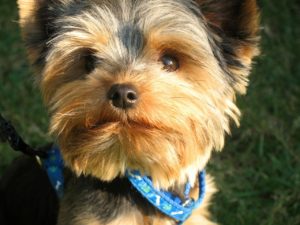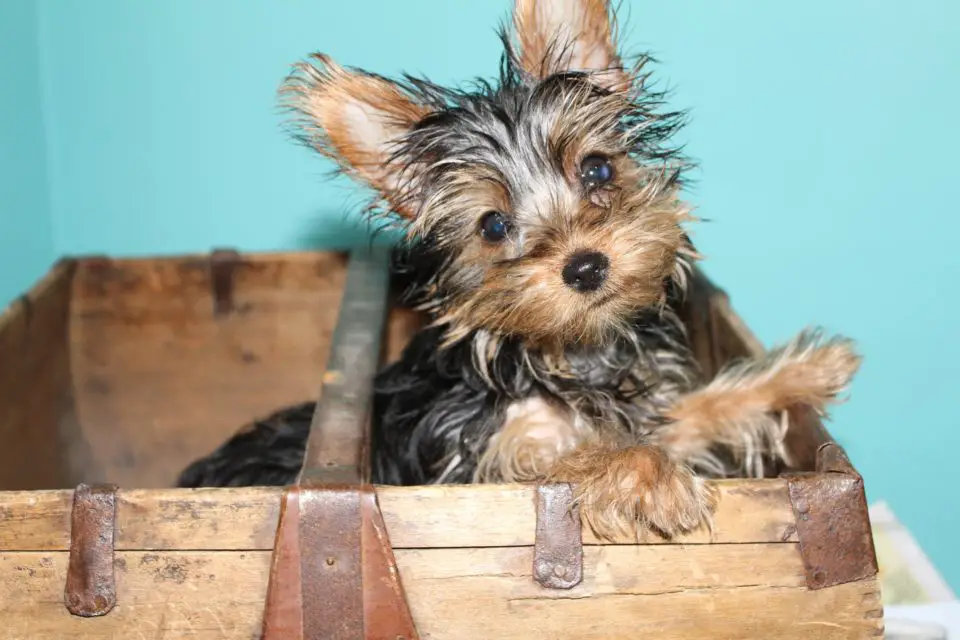Jokingly referred to as “ankle biters,” Yorkshire Terriers are a Top 10 staple on annual Most Popular Dog lists. They are usually one of the last dog’s sitting at any National Dog Show.
Hello, my name is Jennifer and the love of my life was a Yorkshire Terrier. Her name was Selphie and she was my first dog of my own as an adult.
Let’s hit pause for a minute and allow me to clarify that her name is not a cute play on the word “selfie.” It was 1999 and my then-boyfriend was an enthusiastic fan of the Final Fantasy video games.
His aunt bred Yorkshire Terriers and knowing my love of dogs, he gave me one of the last puppies left of the litter. We named her “Selphie” after a character in the Final Fantasy 8 game.
Technically, her official AKC name was “Jen’s Pokey Lil Puppy Selphie.”Sadly, Selphie passed away a few years back at 15-years-old, which is on the higher end of the life expectancy for the breed.
About a year after losing her, I adopted another Yorkshire Terrier, but Lola was already 3-years-old at the time, an age that is well into adulthood for small dogs.
So, I’ve had experience with Yorkshire Terriers at every stage of their lives.
When do Yorkies Stop Growing?
When do Yorkies stop growing? Yorkies typically stop growing around 10-months-old and are fully grown by the time they reach 1 year of age. Their biggest growth spurt happens within the first 12 weeks after birth.
What this means is that you should keep your camera at the ready every moment if you want to document their growth.
If you blink, you really might miss it!
A Brief History of Yorkshire Terriers
Yorkshire Terriers, “Yorkies” for short, descended from a line of terriers from Scotland (not to be confused with the separate Scottish Terrier breed) called the Waterside Terrier.
Originally bred to hunt rats in mines, Yorkshire Terriers eventually became the purse-dwelling lap dogs they are known for today.
 Because of their small size, the American Kennel Club (AKC) categorizes Yorkies in the Toy group instead of the Terrier group. I can attest that Yorkies do not think of themselves as small dogs.
Because of their small size, the American Kennel Club (AKC) categorizes Yorkies in the Toy group instead of the Terrier group. I can attest that Yorkies do not think of themselves as small dogs.
They do not hesitate to mix it up with dogs twice their size. Their instincts as hunters remain and it exhibits itself in watchdog behavior – barking at strangers, loud noises, the wind…
Yorkshire Terriers are famous for their long, silky hair that requires daily grooming to prevent tangles, unless you opt to keep it trimmed short, as I do. Yorkies should still be brushed weekly and grooming appointments are necessary every six weeks or so, as their fur grows quickly.
The research claims that Yorkies don’t get along with other dogs or cats, but my personal experience varies. I have a 10-year-old Weimaraner. If you are familiar with the breed, you know that Weims are very large, especially compared to how small Yorkies are. My Yorkie, Selphie, never took to Ruger, but she shared a dog bed with my cat for many years.
My new Yorkie, Lola, adores Ruger and will jump on his head when she wants to play. Luckily for both dogs, Ruger has a very easy-going, accommodating personality.
Selphie would often snap at him if he came too close to her, but he never reacted. He thought she was playing. She wasn’t.
You often hear that certain dog breeds don’t get along with other dogs or cats, but in my experience, it is a trait of the dog itself, not the entire breed.
Stages of a Yorkie’s Life
I still remember the day I picked Selphie up when she was 8-weeks-old. She slept in my lap the whole drive home.
Years later, she would sleep in my lap during a solo road trip to Florida. Yorkies really are lap dogs, but unlike bigger breeds, Yorkies never grow out of fitting in your lap.
Here is a breakdown of the stages of a Yorkshire Terrier’s life:
Birth to 7-weeks-old: Newborn. Yorkies grow very quickly for their small size. While they are both with eyes closed and no hearing, they can typically walk, hear and have their eyes open by 3-weeks-old.
8-weeks-old to 6-months-old: Puppy. During this age, Yorkies will be full of energy and curious about the world around them.
6-months-old to 1-year-old: Adolescent. This is the best time frame to train a Yorkie puppy housebreaking habits.
1-year-old: Adult. A puppy is officially an adult after just one year!
8-years-old: While there isn’t an official age for Yorkshire terriers to be considered senior dogs, it can be observed as early as 8-years-old. By the age of 10, you’ll notice that your Yorkie naps most of the time and isn’t as energetic as they used to be.
The life expectancy for Yorkies is between 14 and 16 years of age. Smaller dogs generally live longer than large breeds.
How Much Will My Yorkie Weigh?

Yorkshire Terrier puppies weigh between 2 and 5 ounces at birth.
Yes, ounces! They reach 1 to 2 pounds around the 12-week-old mark.
That’s quite the growth spurt!
Once they reach adulthood, Yorkies weigh in between 3 and 7 pounds. They will never grow too big to be picked up and held.
This certainly explains why they fit so easily into purses. The loose change in my purse probably weighs more than Yorkies do.
My Yorkie, Selphie, weighed between 7 and 8 pounds for most of her adult life.
Factors that Affect Growth
Many people decide to purchase a purebred Yorkie from a reputable breeder to avoid any potential medical issues.
Given their small size and popularity, Yorkies are, unfortunately, frequent victims of irresponsible backyard breeding. The issue of rescuing a dog vs. purchasing a purebred is a discussion for another time and place.
There are several factors that can affect your pup’s growth. Some of the more common causes are:
- Diet
Overfeeding or underfeeding a puppy can affect its overall growth and weight. It is important to feed your Yorkie nutritious food that is also specifically made for small dogs.
There isn’t any set amount of food to give to your dog. It depends on how active the dog is and what type of food you are purchasing (or making, if you prefer.)
- Exercise
You might think small dogs don’t need or want much exercise, but they do. While they enjoy snoozing the day away on your lap, Yorkies are very playful and love to explore the outdoors.
They require at least 15-minutes of exercise daily to maintain a suitable weight.
- Medical Conditions
Yorkies are considered a relatively healthy breed. However, they are prone to a medical condition called luxating patella, which is a dislocated kneecap.
It is caused by jumping too high or too often, especially as puppies when they are still growing.
- Genetics
In every litter, there is always a runt, the puppy that is smaller than the other puppies. Sometimes the situation resolves itself and the puppy grows to be the standard size as the other puppies.
But other times, the puppy remains smaller than normal and develops health or personality complications as a result. For example, the runt might be needier than other puppies or need special care.
As previously mentioned, whether a Yorkshire Terrier is purebred or mixed breed also greatly affects its growth and size. Yorkies that are bred by reputable breeders are tested for any genetic medical conditions and anomalies.
Any type of injury or medical condition that prevents your pup from exercising increases the risk of having an overweight or obese dog, which in turn will affect growth rates.

Final Thoughts
One of the greatest things about Yorkshire Terriers – or any small dog, I suppose – is that they will always look like puppies.
Of course, their fur will change color (Yorkie puppies are usually all black and later the fur on their head turns a lighter shade of brown,) but you’ll never have to worry about them getting in the garbage of counter-surfing because they can’t reach that high!
On the downside, this also means they are constantly underfoot and inadvertently trip you. Maybe that’s why people tend to carry their Yorkies – so they don’t trip over them.
(Side note: Even though they are tiny, you should still train them to follow commands, if only because Yorkies forget their size around other dogs.)
Yorkies are a great choice of dog breeds for first-time owners. Yes, they are adorable and cuddly, but more importantly, they are easy to train and care for, as long as you do your research regarding grooming and are willing to commit to a lot of hair brushing.
If you’re looking for some dog training help check out our article about Brain Training for Dogs here!
Also, while I’m on the topic of caring for Yorkies, I would like to include a PSA that applies to any female dog, but especially small dogs, such as Yorkies.
It is imperative to get female dogs spayed when they are young (unless you plan to breed them responsibly) because female dogs that aren’t spayed are highly susceptible to breast cancer.
My Yorkie, Selphie, developed breast cancer around the age of 8. It wasn’t the ultimate cause of her passing away, but her veterinarian said it certainly didn’t help matters.
So, please learn from my mistake and spay your female Yorkies and other small breeds.

One of my ex-boyfriends told me once that I loved Selphie more than I loved him. My relationship with Selphie lasted 11 years longer than my relationship with that guy (or any guy), so I guess he wasn’t wrong.
If you have any comments or questions, please feel free to leave them below!

